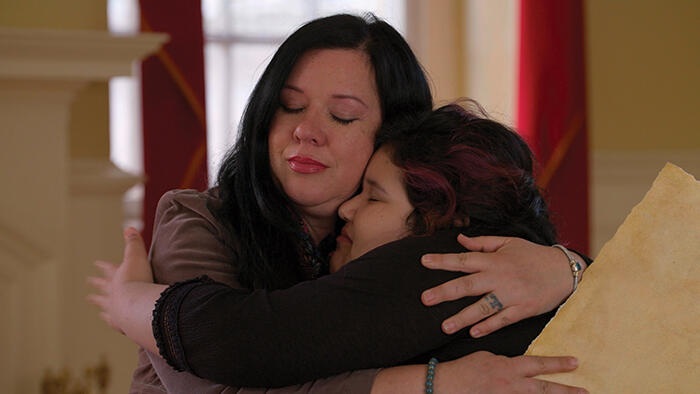
Napo, an award-winning animated short from Miralumo Films, showcases the healing power of multigenerational connection. When an aging man suffering with advancing dementia moves into his daughter’s home, his grandson engages creativity and compassion to provide strength and joy for his mother’s ailing father. The mother then returns her young son’s favor when the boy needs it most. Devoid of dialogue, this special film underscores the priceless attributes of intergenerational care, concern and love. (16 min.)
Available on YouTube | Elementary School
Ryan Cannon’s are you okay? reminds viewers to check in with others about their mental health—and do the same for themselves. When Raquelle sees other students bullying Noah, she brings it to the attention of a school counselor. Students then bully Raquelle for “ratting out” the others. Weighed down by the social media hate they’re receiving, Raquelle and Noah are both feeling depressed. But something wonderful happens when they rely on their empathy skills and ask one another a simple guiding question: “Are you okay?” (8 min.)
Available on YouTube | Middle School
Hindsight is a six-part docuseries that highlights different communities grappling with the effects of COVID-19. Created by filmmakers from various communities of color, each 10- to 15-minute episode details a moving story of isolation turned into resiliency and community care. For example, “We Stay in This House” follows the lives of four mothers who must become full-time caregivers for their families during the pandemic. Their stories demonstrate the disproportionate impact of the pandemic on women of color, such as the frequently cited statistic of women forced to leave the workplace. These quick snapshots work well to contextualize discussions of COVID-19. (82 min.)
Available on PBS | Middle and High School
The Netflix series High on the Hog: How African American Cuisine Transformed America perfectly illustrates Key Concept 9 of LFJ’s Teaching Hard History framework: “Enslaved and freed people worked to maintain cultural traditions while building new ones that sustain communities and impact the larger world.” In this case, it’s all about food. Chef and author Stephen Satterfield takes the viewer from Benin to New York to Texas—and from okra, yams and rice to brisket and, of course, the whole hog. Chronicling the roots of these foods and cooking practices uplifts not only Black people’s survival but also their innovation, resistance to oppression and global impact. (47-58 min.)
Available on Netflix | High School and Professional Development
Original documents are central in the teaching of the most harrowing aspects of U.S. colonial history, and Bounty hinges upon this importance. Citizens of the Penobscot Nation revisit the moment in Boston when, in 1755, the grisly murder of their ancestors is mandated by the colonial government. In this Upstander Project film, Penobscot elders read the original proclamation and explain this sordid past to their children. And despite brutal efforts to erase their existence, they also foreground their resilience and cultural pride. (9 min.)
Available on Vimeo | High School and Professional Development